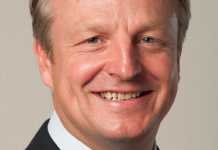Whilst PDO cannot stop these trends, we have raised our game to reduce our energy footprint as much as possible. Optimising oil recovery is part of our normal business, but since 2010, PDO has been using wetlands at Nimr to treat produced water, saving on water injection, disposal and treatment costs and energy consumption. PDO is actively expanding this initiative and is looking at how we can use the treated water to grow crops which are more resistant to its salt content. Internally, we have raised the game on water management through a governance body reporting directly to our executive Managing Director’s Committee.
More recently, we kicked off the deployment of solar steam generation through our Miraah project at Amal. In the pilot which preceded this, the generation of solar steam by using parabolic troughs housed in a greenhouse proved extremely reliable.
By upscaling the venture and entering into a longer partnership with the contractor GlassPoint Solar, PDO has made the application of solar energy for thermal EOR steam economically viable. The project is currently in the construction phase and ahead of plan and we are expecting the first steam to be generated next year. We are already looking to further expand this initiative. On the power generation side, PDO has actively been upgrading power plants, systematically reducing gas consumption per produced barrel.
On the question why PDO can retain focus, the answer is very simple: when taking the long- term view and considering the wider sustainability picture, the initiatives are good business for PDO and Oman.
IN CONTINUATION OF THE PREVIOUS QUESTION, WHAT HAVE BEEN THE EFFECTIVENESS OF MEASURES TAKEN, IN THE LAST TWO-AND-A-HALF YEARS, TO SIGNIFICANTLY IMPROVE PDO’S COST AND OPERATIONAL EFFICIENCY?
First of all, I need to highlight that PDO has been on a journey of continuous business improvement using Lean methodology to streamline our processes and reduce waste for a long time. This means taking consistent small improvement steps across all aspects of our business to achieve our aspirations. In 2014, and before lower oil prices became a reality, a leading benchmark on operational efficiency recommended that PDO should focus on production efficiency and reliability, as its unit operating cost was already considered to be world class. This message strongly aligns with the priorities I outlined earlier.
With the low oil price environment kicking in, PDO, with the support of the government and private shareholders, refocused on generating more short-term cash flow, whilst safeguarding value. We have maintained our course on the big projects which we had already started executing. On the remaining activity, we have significantly rephased projects with large upfront cash sinks and long pay-backs and rapidly accelerated well activity, with pay-backs of less than a year. As an aside, early monetisation of new exploration discoveries alone added 3,000 bbls/d to production in 2015. The combination of these efforts meant that last year we managed to meet, and in many cases surpass, expectations right across our business.
We are currently exceeding our new long-term production plateau of 600,000 bbls/d – which we reached well before our 2019 target. This achievement means we should add around 300 million barrels of production over the next 10 years. Compared to last year’s plan, we also reduced Capex by 20%, kept the Opex budget flat (despite increasing salary costs and inflationary pressures) and, on a like-for-like basis, managed to significantly increase the cash flow to our shareholders.
IN YOUR JOB, YOU NEED TO MAINTAIN A BALANCE BETWEEN THE MINISTRY OF OIL & GAS, SHAREHOLDERS, CONTRACTORS AND VARIOUS DIRECTORATES WITHIN PDO, AND ALIGN THEM TOWARDS ACHIEVING THE OVERALL CORPORATE OBJECTIVES OF PDO. HOW DO YOU MANAGE TO MAINTAIN THIS FINE BALANCE AS EVERY STAKEHOLDER HAS ITS OWN PRIORITIES AND CONSTRAINTS?
This is a complex question, which I’ll break down by stakeholder grouping.
First of all, we have our shareholders, who need PDO to deliver maximum value at the lowest possible cost. We engage with our shareholders on many levels and maintain their trust by showing how we manage the business in a transparent manner. We share our improvement areas and show how we plan to up our game. Our vision is “To be renowned and respected for the excellence of our people and the value we create for Oman and all our stakeholders” and driving our actions in line with this vision helps to unite our diverse shareholder base.






[…] “Committed to excellence and delivering outstanding quality in all aspects, Burjeel Hospital is known to provide advanced medical and healthcare services in Oman since inception, and has consistently worked towards revolutionizing hospital services and facilities,” averred Dr. Raghavan of Burjeel Hospital. […]